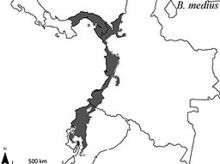Western lowland olingo
The western lowland olingo (Bassaricyon medius) is a species of olingo from Central and South America, where it is known from Panama and from Colombia and Ecuador west of the Andes.[2]
| Western lowland olingo | |
|---|---|
 | |
| Sitting on a branch | |
| Scientific classification | |
| Kingdom: | Animalia |
| Phylum: | Chordata |
| Class: | Mammalia |
| Order: | Carnivora |
| Family: | Procyonidae |
| Genus: | Bassaricyon |
| Species: | B. medius |
| Binomial name | |
| Bassaricyon medius Thomas, 1909 | |
 | |
| Distribution of the western lowland olingo | |
| Synonyms | |
|
Bassariscyon gabbi orinomus Goldman, 1912 | |
Description
The western lowland olingo is smaller than the northern olingo, but larger than the most montane member of the genus, the recently described olinguito ("little olingo").[2] While the Panamanian subspecies B. m. orinomus is about the same size as the eastern lowland olingo, the subspecies from west of the Andes, B. m. medius is smaller.[2] The pelage is slightly lighter than that of the eastern species.[2]
It has a head-body length of 31 to 41 centimetres (12 to 16 in), with a tail length of 35 to 52 centimetres (14 to 20 in).[2] It weighs .9 to 1.2 kilograms (2.0 to 2.6 lb).[2]
Taxonomy
There are two subspecies of the western lowland olingo: the nominate B. m. medius (Colombia and Ecuador) and B. m. orinomus (Panama and possibly Colombia).[2] The closest relative of the western lowland olingo is the other lowland olingo species, B. alleni, found east of the Andes, from which it diverged about 1.3 million years ago.[2]
References
- Helgen, K.; Kays, R.; Pinto, C.; Schipper, J. (2016). "Bassaricyon medius". IUCN Red List of Threatened Species. IUCN. 2016: e.T48637802A48637905. doi:10.2305/IUCN.UK.2016-1.RLTS.T48637802A48637905.en. Retrieved 10 March 2019.
- Helgen, K. M.; Pinto, M.; Kays, R.; Helgen, L.; Tsuchiya, M.; Quinn, A.; Wilson, D.; Maldonado, J. (2013-08-15). "Taxonomic revision of the olingos (Bassaricyon), with description of a new species, the Olinguito". ZooKeys. 324: 1–83. doi:10.3897/zookeys.324.5827. PMC 3760134. PMID 24003317.
